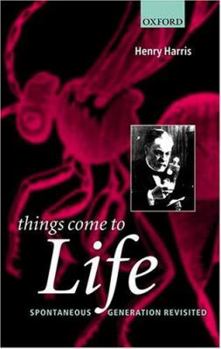Things Come to Life: Spontaneous Generation Revisited
Spontaneous generation is the term used to describe the theory that inanimate material can, under appropriate conditions, generate life forms by completely natural processes, not requiring or involving divine intervention. Although there were always some doubters, the idea held sway from Aristotle until the 17th century- even such noted experimentalists as William Harvey were believers.
From the 17th century onwards, attempts were made to test the idea by experimental results- to see, for example, if flies or later funghi could be generated in sealed containers. The experiments initially gave conflicting results, but with the development of better methods, the idea was whittled away, although it survived in some minds until the last century. Figures as eminent as Leeowenhoek, Pasteur, and Darwin were drawn into the controversy.
The question of whether spontaneous generation really existed occupied not only scientists, but also philosophers, historians, and theologians. It engaged the interest of many different religious groups and many social classes, and was debated with great acrimony. This book deals with the social and religious context of the debate, and the personalities of the protagonists, and it is also the first to examine the experimental evidence and its probative value.
Written by the author of The Birth of the Cell, this is a lucid and authoritative account that will be of interest to scientists, historians, theologians, philosophers and the general public.
From the 17th century onwards, attempts were made to test the idea by experimental results- to see, for example, if flies or later funghi could be generated in sealed containers. The experiments initially gave conflicting results, but with the development of better methods, the idea was whittled away, although it survived in some minds until the last century. Figures as eminent as Leeowenhoek, Pasteur, and Darwin were drawn into the controversy.
The question of whether spontaneous generation really existed occupied not only scientists, but also philosophers, historians, and theologians. It engaged the interest of many different religious groups and many social classes, and was debated with great acrimony. This book deals with the social and religious context of the debate, and the personalities of the protagonists, and it is also the first to examine the experimental evidence and its probative value.
Written by the author of The Birth of the Cell, this is a lucid and authoritative account that will be of interest to scientists, historians, theologians, philosophers and the general public.
Format:Hardcover
Language:English
ISBN:0198515383
ISBN13:9780198515388
Release Date:June 2002
Publisher:Oxford University Press, USA
Length:186 Pages
Related Subjects
Medical Medical Books Science Science & Math Science & Scientists Science & TechnologyCustomer Reviews
0 rating





